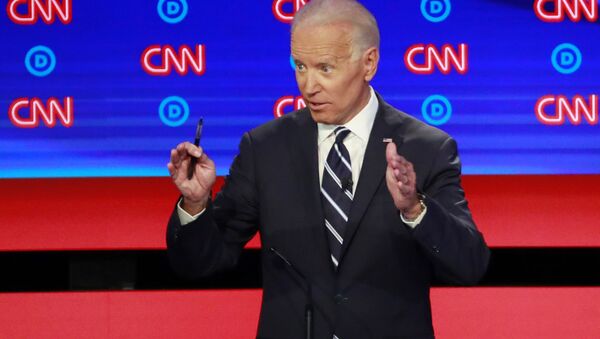As the most experienced politician among the other Democratic candidates, former Vice President Joe Biden is leading in the race for his party's nomination for the presidency, according to polling data. During the debate on Wednesday — the first part was held the previous day — he avoided the mistakes he made during the first debate in June, in which he almost lost to California Senator Kamala Harris, who has since emerged as his main rival.
Daniel Franklin, associate professor of political science, shared his insight on the debates.
Sputnik: Kamala Harris clash with Joe Biden was one of the most vivid memories from First debate. How this conflict played out during second debate stage?
Daniel P. Franklin: Kamala Harris was less successful the second time around.
The irony is that the tactic that elevated her to contender status also made her the target of the same kinds of attacks she leveled at Biden in the First Debate.
In particular, she seemed caught off guard by the vicious attack by Senator Tulsi Gabbard on her record as California State Attorney General.
Intra party primaries are usually not this rough. But Gabbard accused Harris of withholding exculpatory evidence in a death penalty case. That's a pretty serious charge and Harris seemed caught off guard. I don't think the exchange did either candidate any good.
Sputnik: According to polls Joe Biden is still the leader of the democratic race. At the same time, Biden didn’t have a particularly successful first debate. What has changed in his strategy since then?
Daniel P. Franklin: Since Biden didn't really suffer in the polls after the first debate, I don't think his tactics had to materially change. Let's be clear about this. Scoring debating points doesn't necessarily translate into votes.
Hillary Clinton probably "won" all three of her debates with Donald Trump. The problem was that winning a debate doesn't win an election. What these debates are really good for is giving observers more of a clue on style than substance.
The Democrats do have some material differences in their policies but, by and large, most of the differences are rather slight.
Biden didn't have to defend his health plan in this debate so much as he had to demonstrate his preparation for the rigors of the campaign.
Is he sharp enough to beat Donald Trump? Let's not forget that most Democratic voters are looking to win the general election and any candidate who can do that is fine with them.
By all appearances, Biden "cleared the bar". No other candidate on that stage broke out of the pack. That is to Biden's advantage until, that is, he runs into Elizabeth Warren.
Sputnik: Many political experts argued that debates again proved that the Democratic Party is badly divided among moderates and progressive forces. Do you agree with this opinion
Daniel P. Franklin: No, I don't. Democrats disagree over the best way to beat Trump. I think its more a disagreement over tactics than of substance. Once a nominee is chosen, there will be very little division in the Party.
Sputnik: Debates in Detroit will be the last event which included almost all democratic contenders. After that DNC is planning to approve polling and financial requirements and barriers. Could this move seriously affect democratic campaign and what those who won’t be able to qualify are going to do?
Daniel P. Franklin: The whole purpose of the Party rules was to identify the candidates with the most depth and breadth of support. At some point, the field of over 20 candidates has to be winnowed down to a manageable few.
For example, because of the current debate format, forced by the size of the candidate field, Joe Biden has yet to debate Elizabeth Warren.
There needs to be a more direct confrontation between the leading candidates in order to determine which of the contenders is most suited to defeat Donald Trump.
So far the rules have worked pretty well to allow some of the fringe candidates to emerge from the field, most notably Mayor Pete Buttigieg and Former Secretary of Housing and Urban Development Julian Castro.
It has also given a stage to fringe candidates, in the ideological sense, who introduce new ideas and approaches into the debate, most notably Andrew Yang and Marianne Williamson.
Obviously, most of the candidates entered the race with the expectation that would lose.
Therefore, if they don't advance to the September debate and their money dries up, the question becomes whether to continue at their own expense or give up?
Most candidates at that point will give up. I don't think any one of the candidates at either of the debates would consider not supporting their party's nominee or running a third party campaign that would facilitate the reelection of President Trump.
Sputnik: Do you think Democrats managed to find right answers ahead of 2020 campaign? What program could they offer for American voters?
Daniel P. Franklin: I think the Democrats will draft a platform that will be acceptable to enough voters to win the general election.
However, I should note that most research suggests that the most important determinants of the outcome in a presidential election are the direction in growth of the economy, incumbency and the popularity of the president's party.
Thus, actual policy preferences have very little direct effect on the outcomes in elections. That is because in our separation of powers system, it is very unlikely that policy can move too far, too fast.
Therefore, most voters do not take the policy promises of the candidates literally and, instead, vote their parties and pocketbooks.
Sputnik: What do you think about Trump reelection chances?
Daniel P. Franklin: About 50/50 with a slight edge to the Democrat.
Views and opinions expressed in this article are those of Daniel P. Franklin and do not necessarily reflect those of Sputnik.



